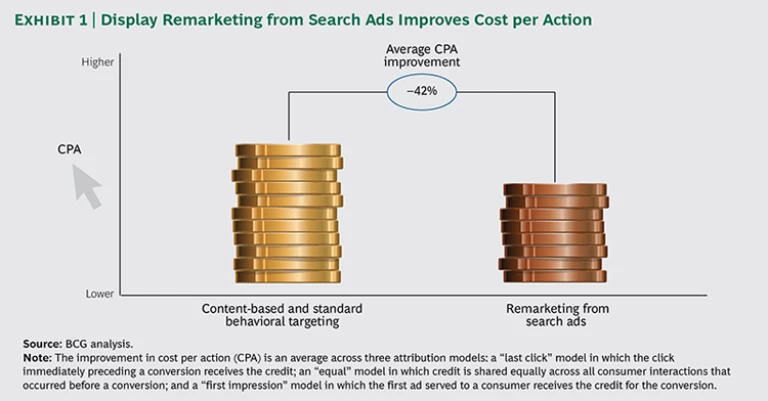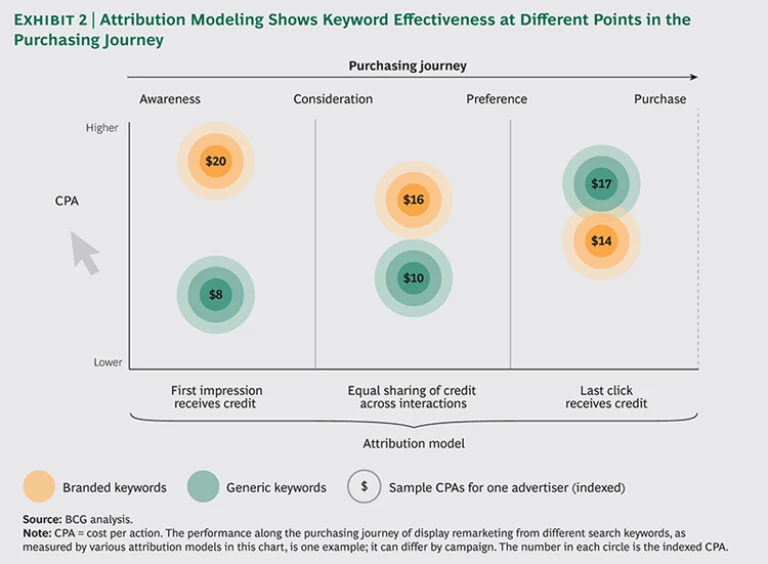Digital advertisers continue to undercut the effectiveness of their own campaigns. Despite rapid improvement in advertisers’ ability to extend reach, enhance targeting, boost consumer engagement, and drive down cost per action (CPA), research by The Boston Consulting Group shows that many marketers (and their agencies) fail to take advantage of the advanced techniques available to them today.
One of the most powerful of these techniques is the use of audience signals from paid search in display advertising. These signals deliver—in real time—actual indications of consumers’ intent that are based on their engagement with paid search ads.
Audience signals are derived from data generated by digital campaigns that advertisers already pay for. Those advertisers that do not use the signals are leaving money on the table. Our research shows that display retargeting from paid search ads can deliver a 40 percent reduction in CPA.
Advanced Techniques Add Impact
Programmatic display advertising has evolved from a content-based approach (targeting users on the basis of the websites they are visiting at the moment) to standard behavioral targeting (collecting information about whether the user has visited a marketer’s website or websites of third-party data providers) to advanced behavioral targeting. The advanced techniques trump content-based and standard-behavioral-targeting data by drawing on audience signals that show how users have interacted with specified information and prompts across a range of digital assets and campaigns, such as paid search campaigns and video.
As we demonstrated in our 2014 report Improving Engagement and Performance in Digital Advertising, only advanced behavioral techniques provide digital campaigns with the high-impact combination of scale (reaching lots of users) and specificity (reaching the right users at opportune times). As a result, using these techniques, advertisers can improve CPA—the critical metric for most digital campaigns—by an average 32 percent and, in some cases, more than 50 percent. The study, which involved five large, diverse, and highly experienced North American and European digital advertisers in four industries (as well as a number of sophisticated agencies), also documented average improvements of 10 percent in cost per click and 28 percent in cost per view-through.
Search Signals Offer Big Benefits for Little Cost
Simply put, display remarketing from search ads involves using audience signals from paid search campaigns to enhance the targeting and effectiveness of programmatic display campaigns. Advertisers are able to identify and reach consumers early in the purchasing journey and then engage them at key points throughout the journey on the basis of their actions, which indicate where they currently are—and where they may be headed—as they form opinions, consider brands, establish preferences, and ultimately decide what to buy.
If a user conducts a keyword search and clicks a paid search ad, the advertiser can use the resulting signal (including the specific keywords) to build remarketing lists for display ads. So, for example, advertisers can compile lists of users who have searched for generic, branded, or competitors’ keywords and remarket to those consumers—at tailored bid prices and display frequencies—using ads designed to engage each group in distinct ways. Alternatively, advertisers can build lists of users who have searched using specific keywords (even at the product level) and remarket to those users with creative content designed for particular products.
Remarketing to consumers who have clicked a search ad is distinct from (and potentially more effective than) content-based targeting or standard remarketing because it is built on data that conveys users’ intent—data that is not generally available to target or shape display campaigns.
Our 2014 study showed that display retargeting from paid search ads delivered, on average, approximately 40 percent lower CPA than content-based and standard-behavioral-targeting techniques. (See Exhibit 1.) Performance was monitored across several attribution models. Some advertisers saw improvements greater than 75 percent, and remarketing from the best-performing groups of keywords generated CPA improvements better than 80 percent.
There’s a further benefit. Leveraging audience signals from paid search in display remarketing enables advertisers to break up the purchasing journey and engage consumers at critical points, such as early in the process when they are gathering basic information.
Consumers typically start with generic keywords and use brand names later in the search process. For some advertisers, display remarketing from generic search keywords worked better than all other techniques when measured using attribution models that assign credit early in the user journey, such as during the first interaction. (See Exhibit 2.)
How Advertisers Can Capitalize
Digital advertisers that use paid search should have ready access to the audience signals the search results generate. Advertisers can take a number of straightforward steps to make sure that their campaigns produce the most useful signals and that they take maximum advantage of this data. These steps include the following:
- Using Unified Platforms. Unified technology platforms make it possible to source audience data from a single pool, eliminating the need to reconcile, consolidate, and transfer data among multiple sources. Unified platforms allow for the seamless sharing of remarketing lists across tools and channels for use in advanced targeting. A unified platform is the only scalable solution for generating real-time audience signals from paid search, providing data that is fresh and complete so that consumers can be retargeted without delay (even in the same browsing session) to ensure maximum relevance.
- Designing Strong and Well-Funded Search Campaigns. This is the prerequisite for effective display remarketing from paid search ads. Putting thought and analysis into the development of high-quality keyword lists (and landing pages) will promote more clicks, the basis of effective remarketing. (The same logic applies to designing high-quality video campaigns for remarketing.)
- Understanding the Purchasing Journey. Users have multiple touch points across different digital channels. Making the most effective use of the associated audience signals requires understanding the ways consumers interact across the full array of an advertiser’s digital assets. Before launching a campaign, advertisers should develop a clear view of the purchasing journey and the impact of different digital media (websites, video sites, and social networks, for example) on the various stages.
- Employing a Test-and-Learn Approach. Advertisers can track remarketing from audience signals and keywords to see which generate the most actions—and where consumers are being engaged along the purchasing pathway. They should continually adjust their campaigns on the basis of experience—and retest.
- Taking a Comprehensive View of Campaign Performance. As advertisers analyze signals across channels, they should use multiple attribution models to assess performance and ensure that they understand the role that each targeting technique is playing across the purchasing journey. Looking only at last-click attribution, for example, reveals nothing about remarketing from keywords used early in the purchasing journey.
Advertisers spend millions on their campaigns. They owe it to their own bottom lines to give themselves the best chance for success. Using audience signals from paid search in display remarketing is a high-impact approach that makes the money spent on paid search work for them in display advertising. Any advertiser with a paid search campaign is already paying for these powerful audience signals—and no advertiser should pass them up.







